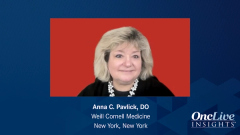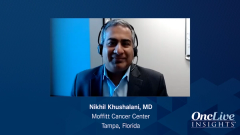
Future Treatment Landscape for Squamous Cell Carcinoma
Expert oncologists look to the future of treatment for cutaneous squamous cell carcinoma.
Episodes in this series

Transcript:
Sunandana Chandra, MD, MS: You’ve both really given a great overview of how cutaneous squamous cell carcinoma [CSCC] systemic therapy has evolved. What are both of you excited about in the near future? Where do you think management of these patients is going? We’ve really kind of focused most of our discussion on the unresectable metastatic setting, but I’d be curious to hear from both of you as to what you think the horizon will look like for these particular patients.
Nikhil Khushalani, MD: I think it almost is melanoma deja vu. With the efficacy that we’ve seen in the advanced setting, we’re now trying to move all of that in the earlier stage. What’s a little more difficult with CSCC is truly trying to identify who are those bad players? Which tumors are the bad ones that deserve adjuvant therapy and are considered high-risk? You really don’t want to run the risk of overtreating your local regional patients. Surgery and/or radiotherapy may be more than adequate for these patients.
As Dr [Neil D. Gross, MD] had demonstrated at ESMO [European Society for Medical Oncology annual meeting] last year and then follow up [in the] New England Journal of Medicine publication, 4 cycles of cemiplimab in the preoperative setting for patients who had high-risk stage 2, 3, and resectable disease. All resectable stage 2, 3, and 4 disease had a pathologic complete response rate of 50%. So at the time of surgery no viable tumor was identified. Of course we’ll still follow this trial for a longer period of time to determine durability of response, but if it’s similar to what we’ve already seen in the melanoma world, I think that is very encouraging because that allows you to potentially deescalate therapy. Or the duration of treatment may simply then be limited to the preoperative setting followed by surgery +/- radiotherapy. These are almost entirely new paradigms that are being devised and investigated so that we can provide a comprehensive treatment map for our patients.
I think the other 2 trials that are hopefully going to be completed in the near future are the 2 adjuvant studies. One is the C-POST study of adjuvant cemiplimab for high-risk CSCC that has been resected and received postoperative radiation. And then we have the adjuvant pembrolizumab trial as well that will clearly help us understand does adjuvant anti-PD-1 immunotherapy in this disease work?
I think the other area that I would be particularly interested in, and quite frankly excited about, would be more in terms of novel therapeutics for the difficult-to-treat population Dr Pavlick mentioned earlier, which is the transplant population. Because the same treatment paradigms don’t apply to them. We certainly need some more novel therapeutics there. Finally, prevention strategies, because these are diseases that with adequate protection, can we actually dent the true incidents of keratin acidic carcinomas. I think we have to pay a lot more attention to prevention strategies as well.
Anna C. Pavlick, DO: How do I follow up that very comprehensive answer? I will also echo the fact that I think the biggest way to make the biggest impact is really with prevention and education. We really need people to understand the dangers of UV [ultraviolet] radiation and that tans are not healthy and see if we can’t change things that way. But yes, I agree that the readouts from those 2 adjuvant trials of the cemiplimab trial following radiation for patients with perineural invasion and the pembrolizumab trial are really going to help us better determine how to make an impact sooner so we don’t need to talk to patients about their metastatic disease.
Transcript edited for clarity.








































